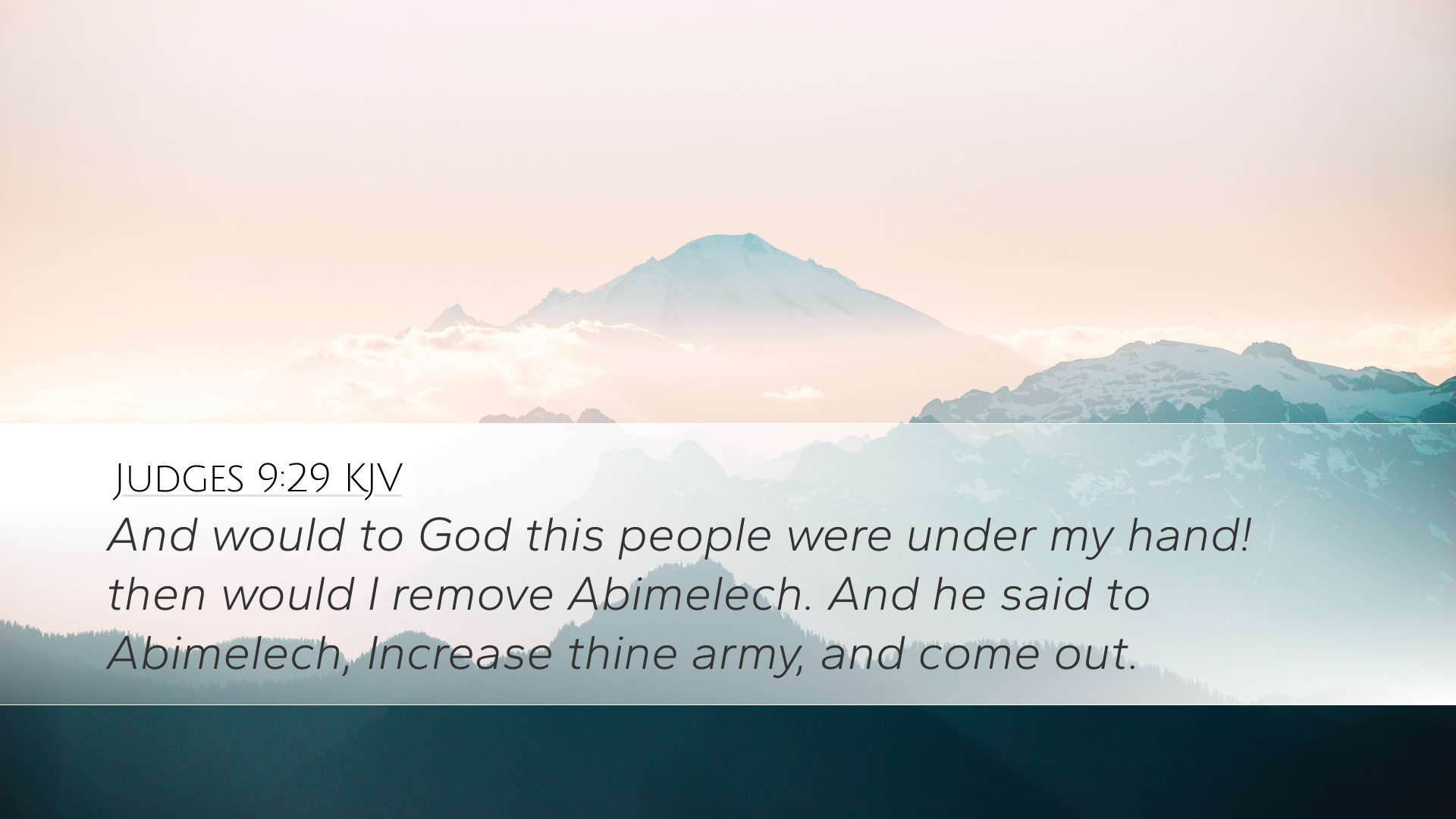Judges 9:29 - Commentary Summary
Verse: "And would God this people were under my hand! Then would I remove Abimelech." - Judges 9:29
This verse is a part of the narrative concerning Abimelech, the son of Gideon, and illustrates the complexity of leadership and the human heart as revealed in biblical history. Here, we explore insights from prominent public domain commentaries.
Context and Background
The context of Judges 9 is crucial for understanding the significance of this verse. Following Gideon's death, the Israelites grappled with leadership and related issues. Abimelech sought power through treachery and violence, leading to the murder of his half-brothers. This verse captures the reflection of a character (likely Jotham, Gideon's surviving son) who critiques the actions of Abimelech and the desires of the people.
Matthew Henry's Commentary
Leadership and Authority: Henry emphasizes the longing for righteous leadership. He interprets the phrase, "would God this people were under my hand," as a lament for the lack of benevolent guidance. The commentary reflects on the desire for a leader who would act justly, contrasting Abimelech's tyrannical rule with the ideal leadership modeled by Gideon.
Human Nature: Henry points out that the inclination of the people to choose a leader like Abimelech reveals the depravity inherent in human choices. The desire for tangible power often supersedes the quest for godly leadership.
Albert Barnes' Notes
Desire for Change: Barnes provides insight into the desire for a change in leadership dynamics. The phrase "would God" expresses a profound wish for a different outcome in governance. He notes that this expression of longing for righteous authority is not merely personal but represents a collective yearning.
Contrast with Abimelech: Barnes draws attention to the contrast between Abimelech's violent ascent to power and the hope for a leader who would bring peace and restoration. The commentary highlights the cyclical nature of Israel's leadership crises, illustrating the consequences of turning away from divinely appointed leaders.
Adam Clarke's Commentary
Examination of Motives: Clarke delves deeper into the psychological and moral motivations behind Jotham's statement. He interprets this verse as a reflection on the consequences of Israel's choice to follow Abimelech, advocating for a return to divine principles as the foundation for leadership.
Judgement and Redemption: Clarke emphasizes the themes of judgment and the potential for redemption. The longing for righteous leadership can also be viewed as a desire for national restoration, urging the Israelites to seek a leader who aligned with God's will rather than human ambition.
Theological Implications
- Divine Sovereignty: The verse reflects on the sovereignty of God in establishing leaders and the repercussions of disobedience in selecting leaders contrary to His will.
- Human Responsibility: There is an inherent responsibility for the people to recognize suitable leadership. The lamentation over Abimelech serves as a reminder of the importance of discernment in leadership selection.
- Hope for Goodness: Jotham's statement embodies a hope that does not despair, but rather seeks renewal and a return to God's designs for leadership among His people.
Application for Today
The reflections on Judges 9:29 challenge contemporary leaders and congregations. Understanding the historical context illuminates modern struggles within church and community leadership.
- Seeking Righteous Leadership: Communities must be vigilant in seeking leaders who embody integrity and godly principles.
- Discernment in Choices: The text encourages self-examination within congregations about the nature and motives behind chosen leaders.
- Prayer for Leaders: The longing expressed in this verse serves as a call to prayer, urging believers to pray for righteous leaders who will guide according to God's ways.
Conclusion
Judges 9:29 serves as a poignant reminder of the complexities of leadership and the constant need for alignment with divine principles. As theologians, pastors, and students delve into this verse, they are invited to reflect on the implications it holds for leadership in their contexts, affirming the timeless truths embedded within scripture.


